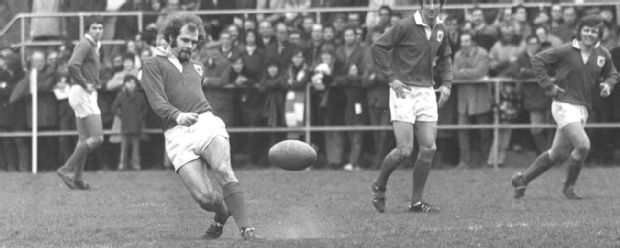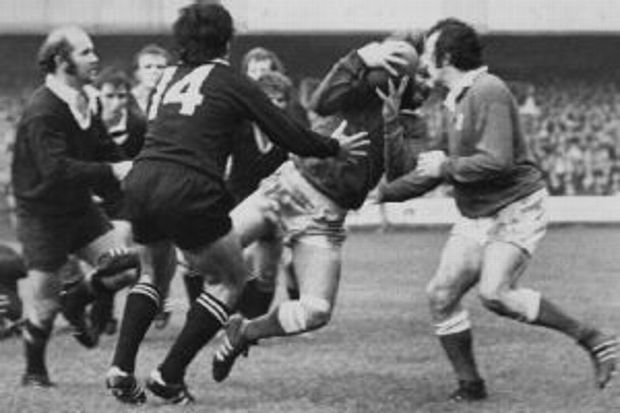|
Wales
'Man of parts' John Taylor has given rugby his all
Huw Richards
July 21, 2015
 John Taylor kicks for safety© Allsport Hulton/Archive Rugby players being both clubbable and fond of reunions, it seems a fair bet that the surviving legends of Welsh rugby in the 1960s and 1970s will have been seeing a fair amount of each other this year. John Taylor turns 70 on Jul. 21, following on from Barry John (Jan. 6) and Gerald Davies (Feb. 7). If this comes as a shock to many of us - when the sporting heroes of one's youth attain the biblical allotted span, we cannot be so very far behind - it also prompts the reflection that he will have needed every one of those 70 years to pack in a multiplicity of activities. He is, as Scots were once wont to say, "a man of parts". Posterity may rank him, considered purely as a player, just below the ranks of the truly legendary - the status attained without question by Gerald, Barry, Gareth Edwards, J.P.R Williams and his back-row colleague Mervyn Davies. But when it considers the full extent of his achievements he will lose nothing by comparison with any of them, and in one crucial respect exceeds them all. He has also been at different times journalist, broadcaster, businessman and club official. It is a life which has cast him as a member of many teams - at the Mail on Sunday, ITV Sport, as part of the broadcast team at the 2012 London Olympics and here at Scrum, where he has been a supportive long-term presence. Three teams, though, stand out - London Welsh, Wales and the Lions. He has given a lifetime of service to the Exiles, standing down as chief executive only a couple of years ago. He also represents an important thread in the club's existence. If its main function has been to provide an outlet for a Welsh rugby diaspora who had learnt the game at home before working life took them to London, Taylor represents those who grew up in England - he was born and educated in Watford - but felt a stronger affinity with Welsh descent. If he was happy in his timing - training as a teacher at Loughborough College when it had no equal as a nursery for thinking rugby players, then joining London Welsh just as the club was being revolutionised under John Dawes' leadership - he was also a player perfectly fitted to those times, a smart, highly mobile back-rower whom Gareth Edwards has recalled as being "first to the loose ball, and always setting up the next move and thinking about the one after that". It was those qualities which the Welsh selectors recognised in precipitating him into the national team on the strength of not much more than a brilliantly effective Christmas 1966 tour of Wales, and which kept him there for several memorable years. There is a certain irony in the best remembered moment of his 26-cap Wales career being a kick at goal. The last-minute touch-line conversion of Gerald Davies' try, clinching a 19-18 victory over Scotland at Murrayfield in 1971 may indeed have been "the greatest conversion since St Paul", but it was one of only five kicks he landed for Wales - although he was a much more regular marksman for London Welsh, his career total of 933 points the highest in the club's first century of history. Those Wales teams are rightly remembered for brilliant backs. But the truly innovative aspect of their play, drawing on the vision of national coaching adviser Ray Williams, was the use of the back row as an attacking weapon.  John Taylor© (Photo by Leonard Burt/Central Press/Hulton Archive/Getty Images) Taylor himself has acknowledged that the key to this transformation was the unique set of skills offered at No.8 by his Exiles clubmate Mervyn Davies, allowing Wales to play both himself and Dai Morris. But he and Morris, whose unobtrusive excellence made him a harbinger of more recent flankers like Richard Hill and Dan Lydiate, brought immense qualities of their own to a superbly balanced back-row combination. Yet several times he had reason to fear for his international future. Being little known in Wales made his initial selection controversial. His first season in 1967 might have been his last, but for the debut heroics of Keith Jarrett against England averting Wales' first championship whitewash. But the real threat to his international future came in the 1969-70, when - revolted by what he had seen of apartheid as a British Lion in South Africa in 1968 - he declared himself unavailable to play against the touring Springboks. It was an act of immense moral courage, putting his rugby ambitions on the line over an issue of principle that much of the rugby world did not at the time, or for some time after, even pretend to understand. It is the reason why he does not have another team on his resume - the Barbarians, whose antediluvian president of the time declared him "a Communist". Wales also left him out for the next three matches, succumbing only to the irrefutable evidence of a 14-0 shellacking in Dublin, with opposing back rower Ken Goodall running amok. His restoration against France at the end of 1970 saw Wales begin a run of eight consecutive Five Nations victories incorporating the 1971 Grand Slam, enabled by his conversion-kicking heroics in Edinburgh (where he had also scored one of his four tries for Wales), and the truncated campaign of 1972. The same period saw him make another Lions tour, to New Zealand in 1971, where he was an integral part of the Test team, playing all four Tests and characteristically producing his best display in the third when roused by being initially omitted for Fergus Slattery. His last Wales cap came in 1973, but he was still a sufficient force with London Welsh - where he had succeeded Dawes as captain - to be asked about his availability for the 1974 Lions. Since that team was going to South Africa, and apartheid still had 20 years to run, there was only ever going to be one answer. He played on with Welsh until 1978, coming back from horrific injuries received in a match against Bath, his total of 285 appearances falling just short of their then club record. That distinguished contribution to journalism, broadcasting and club administration followed. His has been some life - one defined by rugby, but also showing that he sees the game in perspective, always accepting that there are greater and more important things. As erstwhile team-mates issue second autobiographies, it seems puzzling that someone who has lived so full a life has yet to publish a memoir, although there is a first-person element to his excellent Decade of the Dragon. But there may be a simple explanation. Seventy or not, he's probably still too busy to find the time for a book which, as a proper writer, he'd want to do himself. Happy birthday, JT. And may there be many more.... © Huw Richards
|
Live Sports
Communication error please reload the page.
-
Football
-
Cricket
-
Rugby
-
- Days
- Hrs
- Mins
- Secs
F1 - Abu Dhabi GP
Abu Dhabi Grand Prix December 11-131. Max Verstappen ()
2. Valtteri Bottas (Mercedes)
3. Lewis Hamilton (Mercedes)
4. Alexander Albon ()
5. Lando Norris ()
6. Carlos Sainz Jr ()
-
ESPNOtherLive >>
Golf - Houston Open
Snooker - China Open
Tennis - Miami Open

